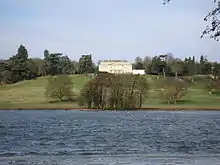James Colebrooke
Sir James Edward Colebrooke, 1st Baronet (21 July 1722[1] — 10 May 1761)[2] sat in the House of Commons from 1751 to 1761.

Early life
He was the son of James Colebrooke, of Chilham Castle, Kent,[3] a very prominent private banker in London,[4] and his wife Mary Hudson. He and his brother George were educated at Leiden University; on his return to Britain he married Mary Skynner, daughter and co-heiress of Stephen Skynner of Walthamstow, Essex, and Mary Remington, in May 1747.
Career
Shortly thereafter he bought Gatton Park from William Newland, with the proprietorship of the borough of Gatton, and the privilege of sending two members to the House of Commons.[5] He duly exercised the privilege, sitting in the House of Commons from 1751 to 1761.
Sir James was invested as a Knight and was created 1st Baronet Colebrooke, of Gatton, county Surrey (Great Britain) on 12 October 1759, with a special remainder to his brother, George.[6] He left two daughters, Emma, Lady Tankerville who was a botanist[7] and Mary (1750–1781), who married Sir John Aubrey, Bt.. On his death in 1761 the baronetcy and Gatton Park passed to his brother George.
Notes
- John Burke, A General and Heraldic Dictionary of the Peerage and Baronetage of the British Empire vol. I, 1832, s.v. "Colebrooke, Sir James".
- Statistics in the article are drawn from L.G. Pine, The New Extinct Peerage 1884-1971: Containing Extinct, Abeyant, Dormant and Suspended Peerages With Genealogies and Arms (London, U.K.: Heraldry Today, 1972:80), reported in thePeerage.com.
- A citizen and member of the Mercers Company of London, according to Burke 1832, which has "Childham Castle".
- "The cash for bankers' notes of undoubted capitals and credit, such as a Child, a Hoare and a Colebrook, is but rarely called for, but if these notes fall into people's hands who are not their customers, then payment is immediately demanded," wrote Philip Cantillon, in The Analysis of Trade &c (London, 1759:173), quoted in Henry Dunning Macleod, The Theory and Practice of Banking: With the Elementary Principles of Currency, Prices, Credit, and Exchanges vol. ii (London: Longmans, Green) 1856:58 §74.
- Owen Manning and William Bray, The History and Antiquities of the County of Surrey, (1803-14, reprinted 1974).
- Sir George was elected a member of the Royal Society of Antiquaries, represented Arundel in Parliament and was a deputy-director of the British East India Company, and a patentee in New Hampshire, for whom Colebrook, New Hampshire, is named.
- "Philip Mould | Historical Portraits | Emma, Countess of Tankerville | Daniel Gardner | Item Details". historicalportraits.com. Retrieved 24 May 2020.
| Parliament of Great Britain | ||
|---|---|---|
| Preceded by Charles Knowles Paul Humphrey |
Member of Parliament for Gatton 1751–1761 With: Charles Knowles 1751–1752 William Bateman 1752–1754 Thomas Brand 1754–1761 |
Succeeded by Thomas Brand Edward Harvey |
| Baronetage of Great Britain | ||
| New creation | Baronet (of Gatton) 1759–1761 |
Succeeded by George Colebrooke |